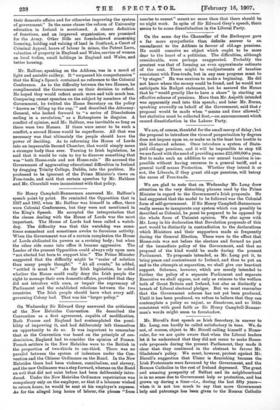On the same day the Chancellor of the Exchequer gave
a far more sympathetic than definite answer to an amendment to the Address in favour of old-age pensions. He could conceive no object which ought to be more dear to the heart of a politician. The difficulties, although considerable, were perhaps exaggerated. Probably the greatest was that of forming an even approximate estimate of the oast There might be readjustments of taxation consistent with Free-trade, but in any case progress must be "by stages." He was anxious to make a beginning. He did not know where the money could be found, and he would not anticipate his Budget statement, but he assured the House that he "would greatly like to have a share" in starting an effective scheme of pensions. f,fore than Mr. Asquith intended was apparently read into this speech: and later Mr. Burns, speaking avowedly on behalf of the Government, said that e proposal would be made when "means and time allowed,* but statistics must be collected first,—an announcement which caused dissatisfaction in the Labour Party.






































 Previous page
Previous page